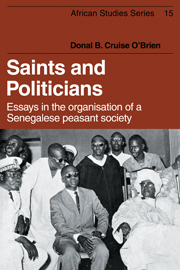2 - LAND, CASH AND CHARISMA
An economic sociology of the Mouride brotherhood
Published online by Cambridge University Press: 04 August 2010
Summary
INTRODUCTION: A MYTH OF EXPLOITATATION
The saints of the Mouride brotherhood (the spiritual heirs to Amadu Bamba and his associates) have consistently been portrayed by outside observers as a holy aristocracy enjoying great material privileges through the economic exploitation of some half a million poor peasant disciples. The disciple is promised his reward in the next world, and paradise is purchased from the saint by work in his service and by more or less regular cash instalments. The saintly vehicle of salvation sits back and enjoys the profits. The brotherhood as a whole, with its elaborate hierarchy of saintly authority, then becomes in caricature no more than an unusually successful variant of a familiar type of sacred confidence trick.
This is caricature, certainly, but one which remains quite plausible to the secular mind. The more successful saints do display their wealth with ostentation. The Citroën, Mercedes-Benz, Chevrolet, are commonplace enough sights in and around the brotherhood's capital at Touba. The saintly houses, at which these limousines are parked, are large and sumptuous by local rural standards – though generally inferior to the residences even of middle-level civil servants in Dakar. Fine clothes, expensive French perfumes, a retinue of servants, young and beautiful concubines, complete the picture of a luxury which is striking enough when set against the poverty of a local peasant family with its average annual income (per head) of some twenty pounds.
- Type
- Chapter
- Information
- Saints and Politicians , pp. 57 - 84Publisher: Cambridge University PressPrint publication year: 1975



